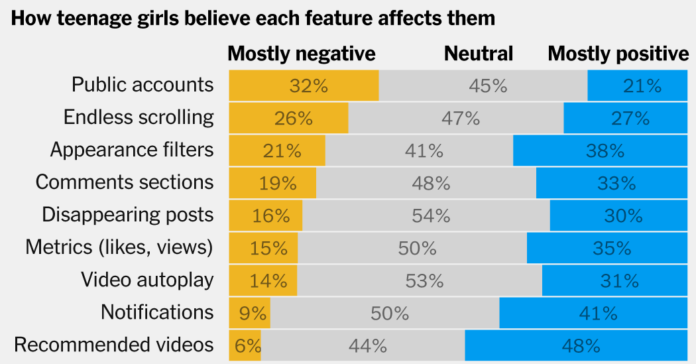Research has not yet shown which sites, apps or features of social media have which effects on mental health. “We don’t have enough evidence to tell parents to get rid of a particular app, or cut it off after a particular number of hours,” said Sophia Choukas-Bradley, a psychologist and director of the Teen and Young Adult Lab at the University of Pittsburgh.
It’s also hard to prove that social media causes poor mental health, versus being correlated with it. Most studies measure time spent on social media and mental health symptoms, and many, though not all, have found a correlation. But other researchers say measuring time spent isn’t enough: In these studies, it’s unclear if time on social media is the problem, or if it’s time away from other things like exercising or sleeping. And the studies obscure, for instance, if someone is spending hours on screens to escape mental duress or to seek support from friends.
A few studies have tried novel approaches around these problems. One, early in Facebook’s rollout in the mid-2000s, compared college campuses that had received access to it with those that hadn’t, and found that its arrival had a negative effect on students’ mental health.
A carefully designed study, Project Awesome at the University of Amsterdam and Erasmus University in Rotterdam, looks at both the average effects of social media on 1,000 teenagers it surveys and how they differ by individual, and follows adolescents over time. It has found that time spent on social media is less of a factor than teenagers’ moods while using it.
Other studies have used brain scans to show that when adolescents looked at likes or frequently checked feeds, it activated brain sensitivity to social rewards and punishments.
What else does the research show?
“We most often find a small, negative correlation” between social media use and mental health, said Amy Orben, a psychologist who leads the Digital Mental Health Group at the University of Cambridge. “But we don’t know what’s underlying that. It could be that those who feel worse start using more social media, it could be that social media makes them feel worse, or it could be socioeconomic status or something else causing that link.”
Overall, research finds that social media is not inherently beneficial or harmful, and its effects depend on individuals and what they see.



